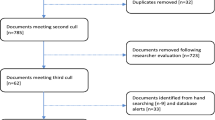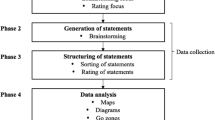Abstract
The study contributes to the inter-disciplinary field of deliberative pedagogy (DP), which is an engaged learning approach focused on academic processes that facilitate student learning of values, attitudes, and skills that support deliberative practice (Shaffer et al. 2017, xxi). The analysis examines the perceived effects of a DP course on Israeli students’ attitudes associated with the idea of deliberative democracy. The semester-long process was implemented at a private liberal arts college in Israel during three consecutive academic years in 2012 through 2015. Taking a grounded theory approach, the thematic analysis is based on open-ended questionnaire data completed by students who participated in the course (N = 48), and examines their perceptions of the course’s effects. Findings provide empirical support for the theoretical conceptualization of DP as a social learning process designed to affect students’ attitudes associated with deliberative practice within their particular social-political context. The study also contributes to the understanding of deliberative faith and its role in deliberative pedagogy. The author discusses the implications for Israel and similarly conflicted political contexts as well as for the field at large.
Similar content being viewed by others
Notes
This study is part of a broader research.
Quotes are the author’s translation of the original Hebrew responses.
References
Boud, D., Keogh, R., & Walker, D. (2013). Reflection: turning experience into learning. Falmer: Routledge.
Brammer, L. R., & Morton, A. (2014). Course-based civic engagement: understanding student perspectives and outcomes. International Journal for the Scholarship of Teaching and Learning, 8(1), 9. https://doi.org/10.20429/ijsotl.2014.080109.
Burkhalter, S., Gastil, J., & Kelshaw, T. (2002). A conceptual definition and theoretical model of public deliberation in small face—to—face groups. Communication Theory, 12(4), 398–422. https://doi.org/10.1111/j.1468-2885.2002.tb00276.x.
Carcasson, M. (2010). Facilitating democracy: centers and institutes of public deliberation and collaborative problem solving. New Directions for Higher Education, 2010(152), 51–57. https://doi.org/10.1002/he.412.
Carcasson, M., & Sprain, L. (2016). Beyond problem solving: reconceptualizing the work of public deliberation as deliberative inquiry. Communication Theory, 26, 41–63. https://doi.org/10.1111/comt.12055.
Center Bureau of Statistics [Israel] (CBS) (2018). Retrieved 5 January 2019 from http://www.cbs.gov.il/reader.
Damasio, A. (1994). Descartes error: emotion, reason and the human brain. New York: Gros set/Putnam.
Damasio, A. (2003). Looking for Spinoza: joy, sorrow and the feeling brain. New York: Harcourt, Inc.
Damasio, A. (2018). The strange order of things: life, feelings, and the making of culture. New York: Phanteon Books.
Dori-Hacohen, G. (2019). Hitlahamut: a term for unreasonable populist public talk in Israel. Discourse & Society. Online first. https://doi.org/10.1177/0957926518816193.
Dori-Hacohen, G., & Livnat, Z. (2015). Negotiating norms of discussion in the public arena: the use of irony in Israeli political radio phone-in programs. Journal of Communication, 65(6), 909–931. https://doi.org/10.1111/jcom.12186.
Dori-Hacohen, G., & Shavit, N. (2013). The cultural meanings of Israeli Tokbek (talk–back online commenting) and their relevance to the online democratic public sphere. International Journal of Electronic Governance, 6(4), 361–379.
Drury, S. A. M. (2015). Deliberation as communication instruction: a study of a climate change deliberation in an introductory biology course. Journal on Excellence in College Teaching, 26(4), 51–72.
Dryzek, J. S. (2000). Deliberative democracy and beyond: liberals, critics, contestations (chapter 3). NY: Oxford University Press.
Elias, N., & Kemp, A. (2010). The new second generation: non-Jewish Olim, Black Jews and children of migrant workers in Israel. Israel Studies, 15(1), 73–94.
Fraser, W. (1995). Learning from experience. Empowerment or incorporation? Leicester: National Institute of Adult Continuing Education.
Gastil, J. (2008). Political communication and deliberation. London: Sage.
Gastil, J., & Dillard, J. (1999). The aims, methods, and effects of deliberative civic education through the National Issues Forums. Communication Education, 48(3), 179–192.
Gastil, J., & Xenos, M. (2010). Of attitudes and engagement: clarifying the reciprocal relationship between civic attitudes and political participation. Journal of Communication, 60(2), 318–343. https://doi.org/10.1111/j.1460-2466.2010.01484.x.
Glaser, B., & Strauss, A. (2009). The discovery of grounded theory: strategies for qualitative research. New Brunswick: Transaction Publishers.
Gutmann, A., & Thompson, D. (1996). Democracy and disagreement. Cambridge, MA: Harvard University Press.
Hermann, T., Cohen, C., Heller, E., Lazar-Shoef, T., & Omar, F. (2017). The Israeli democracy index 2017. Jerusalem: The Israel Democracy Institute. From https://www.idi.org.il/media/9684/israeli-democracy-index-2017-he.pdf. Accessed 21 Feb 2019.
Horowitz, D., & Lissak, M. (1989). Trouble in utopia: the overburdened polity of Israel. Albany, NY: Suny University Press.
Katriel, T. (1986). Talking straight: dugri speech in Israeli Sabra culture. Cambridge.
Katriel, T. (2004). Dialogic moments: from soul talks to talk radio in Israeli culture. Detroit: Wayne State University Press.
Knobloch, K., & Gastil, J. (2015). Civic (re)socialisation: the educative effects of deliberative participation. Politics, 35(2), 183–200. https://doi.org/10.1111/1467-9256.12069.
Kolb, A., & Kolb, D. (2005). Learning styles and learning spaces: enhancing experiential learning in higher education. Academy of Management Learning & Education, 4(2), 193–212.
Lerner, J. (2014). Making democracy fun: how game design can empower citizens and transform politics. Boston: MIT Press.
Lev Ari, L., & Laron, D. (2014). Intercultural learning in graduate studies at an Israeli college of education: attitudes toward multiculturalism among Jewish and Arab students. Higher Education, 68(2), 243–262.
Lev Ari, L., & Mula, W. (2017). “Us and them”: towards intercultural competence among Jewish and Arab graduate students at Israeli colleges of education. Higher Education, 74(6), 979–996.
Longo, N. (2013). Deliberative pedagogy in the community: connecting deliberative dialogue, community engagement, and democratic education. Journal of Public Deliberation, 9(2), Article 16. Retrieved 21 February 2019 from http://www.publicdeliberation.net/jpd/vol9/iss2/art16.
Longo, N. V., Manosevitch, I., & Shaffer, T. J. (2017). Introduction (xix-xxxv). In T. J. Shaffer, N. V. Longo, I. Manosevitch, & M. S. Thomas (Eds.), Deliberative pedagogy: teaching and learning for democratic engagement. East Lansing: MSU Press.
Mahler, G. S. (2016). Politics and government in Israel: the maturation of a modern state. Maryland: Rowman & Littlefield.
Manosevitch, I. (2017). Deliberative pedagogy in Israeli higher education: a course curriculum for preparing a deliberative student conference (61-70). In T. J. Shaffer, N. V. Longo, I. Manosevitch, & M. S. Thomas (Eds.), Deliberative pedagogy: teaching and learning for democratic engagement. East Lansing: MSU Press.
Mathews, D. (1999). Politics for people. Urbana: Illinois University Press.
McClurg, S. D. (2006). The electoral relevance of political talk: examining disagreement and expertise effects in social networks on political participation. American Journal of Political Science, 50(3), 737–754. https://doi.org/10.1111/j.1540-5907.2006.00213.x.
McGuire, W. (1985). Attitudes and attitude change. In G. Lindzey & E. Aronson (Eds.), The handbook of social psychology (Vol. 2, 3rd ed., pp. 233–346). NY: Random House.
McLeod, J., Scheufele, D., & Moy, P. (1999). Community, communication, and participation: the role of mass media and interpersonal discussion in local political participation. Political Communication, 16(3), 315–336. https://doi.org/10.1080/105846099198659.
McMillan, J., & Harriger, K. (2002). College students and deliberation: a benchmark study. Communication Education, 51(3), 237–253. https://doi.org/10.1080/03634520216518.
Mill, J. (1985). On liberty. Indianapolis: Liberal Arts Press.
Mutz, D. (2006). Hearing the other side: deliberative versus participatory democracy. New York: Cambridge University Press.
Omar, F. (2017). The 2016 Israeli democracy index: attitudes of Arab citizens of Israel. Jerusalem: The Israeli Institute of Democracy and the Guttman Center. From https://www.idi.org.il/media/7799/democracy-index-2016.pdf. Accessed 20 Feb 2019.
Otten, M. (2003). Intercultural learning and diversity in higher education. Journal of Studies in International Education, 7(1), 12–26. https://doi.org/10.1177/1028315302250177.
Park, E., & Choi, B. (2014). Transformation of classroom spaces: traditional versus active learning classroom in colleges. Higher Education, 68(5), 749–771.
Pincock, H. (2012). Does deliberation make better citizens. In Nabatchi, Gastil, Weiksner, & Leighninger (Eds.), Democracy in motion: Evaluating the practice and impact of deliberative civic engagement (pp. 135–162). New York: Oxford University Press.
Reed, M., Evely, A., Cundill, G., Fazey, I., Glass, J., Laing, A., Newig, J., Parrish, B., Prell, C., Raymond, C., & Stringer, L. (2010). What is social learning? Ecology and Society, 15(4).
Rubinstein, A. (2017). Tribes of Israel: together and apart: liberalism and multiculturalism in the Jewish state. Israel: Kinneret, Zmora-Bitan, Dvir.
Ryfe, D. (2005). Does deliberative democracy work? Annual Review Political Science, 8, 49–71. https://doi.org/10.1146/annurev.polisci.8.032904.154633.
Shaffer, T. (2014). Deliberation in and through higher education. Journal of Public Deliberation, 10, 1. Retrieved 21 February 2019 from http://www.publicdeliberation.net/jpd/vol10/iss1/art10.
Shaffer, T. J., Longo, N. V., Manosevitch, I., & Thomas, M. S. (Eds.). (2017). Deliberative pedagogy: teaching and learning for democratic engagement. East Lansing: MSU Press.
Siu, A., & Stanisevski, D. (2012). Deliberation in multicultural societies: addressing inequality, exclusion, and marginalization. In Nabatchi, Gastil, Weiksner, Leighninger (Eds.), Democracy in motion: Evaluating the practice and impact of deliberative civic engagement (pp. 83–102). New York: Oxford.
Tomlinson, M. (2018). Conceptions of the value of higher education in a measured market. Higher Education, 75(4), 711–727.
Weiksner, M., Gastil, J., Nabatchi, T., & Leighninger, M. (2012). Advancing the theory and practice of deliberative civic engagement: a secular hymnal. In Nabatchi, Gastil, Weiksner, Leighninger (Eds.), Democracy in motion: Evaluating the practice and impact of deliberative civic engagement (pp. 261–273). New York: Oxford.
Yair, G. (2000). Reforming motivation: how the structure of instruction affects students’ learning experiences. British Educational Research Journal, 26(2), 191–208.
Young, I. (2000). Inclusion and democracy. NY, Oxford.
Zakaria, F. (2015). In defence of liberal education. NY: Norton & Co..
Zanna, M., & Rempel, J., (1988). Attitudes: a new look at an old concept. In D. Bar-Tal, & A. Kruglanski (Eds.), The social psychology of knowledge (pp. 315–334). NY, Cambridge.
Acknowledgements
I thank anonymous reviewers for their helpful comments on earlier drafts, and Naama Weiss-Yaniv for her help with the data analysis. I also wish to express my sincere gratitude to the Kettering Foundation for their support of this project, especially to Maxine Thomas for bringing me into the Deliberative Pedagogy Research Group which provided a stimulating space for developing these ideas. I thank my colleagues at Netanya Academic College for their help and support with the implementation of the student conferences over the years. Most of all, I am grateful to the wonderful students who helped lead the deliberative student conferences, specifically Dana Braunstein, Maggie Ben Gad, Daniel Elfenbain, Michal Manger, Ori Tenenboim, and Idan Vaknin, and to all the students who participated in my course Conference Project. Without their willingness to step into the unknown, and their engaged participation, cooperation, and enthusiasm, this project could not have been realized.
Author information
Authors and Affiliations
Corresponding author
Additional information
Publisher’s note
Springer Nature remains neutral with regard to jurisdictional claims in published maps and institutional affiliations.
Rights and permissions
About this article
Cite this article
Manosevitch, I. Deliberative pedagogy in a conflicted society: Cultivating deliberative attitudes among Israeli college students. High Educ 78, 745–760 (2019). https://doi.org/10.1007/s10734-019-00368-6
Published:
Issue Date:
DOI: https://doi.org/10.1007/s10734-019-00368-6




